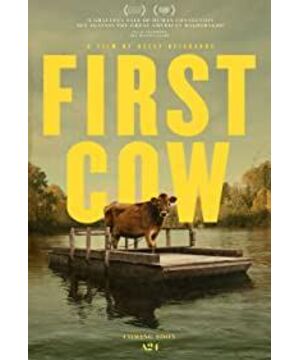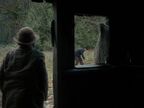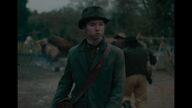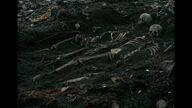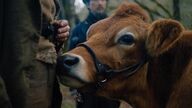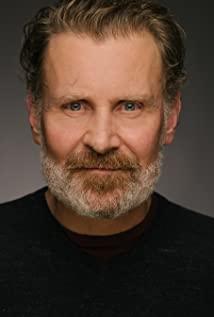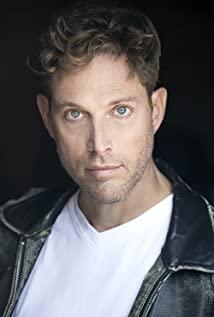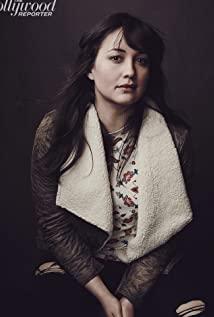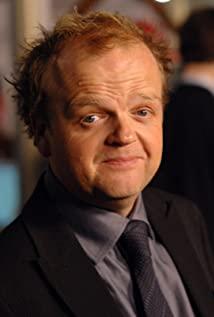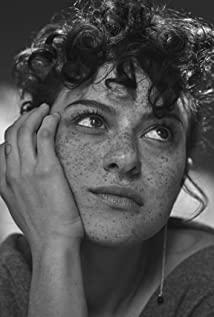first cow
Director: Kelly Leichhardt
Writers: Jonathan Raymond, Kelly Leichhardt
Starring: John Magaro, Orion Lee, etc.
Type: Drama
Release date: 2019-08-30 (Telluride Film Festival) / 2020-07-10 (US)
A huge freighter sailed slowly along a large river in Oregon. A black dog roamed idle on the shoal. Not far away, a girl dug through the soil and found two human skeletons, shoulder to shoulder.
Although at the very beginning of the film, we have already seen the ending of the protagonists Figowitz and Jing Lu, but this still does not prevent director Kelly Leichard from telling the stories of these two people.
In the 1820s, the state of Oregon in the United States, although it had existed as a colony for hundreds of years, was still in wild chaos. Countless people with the "American Dream" come and go in this land, as do Jing Lu and Figowitz. Fate made the two men meet again in this forest-wrapped camp, and the two began to form a team to fight for their "first pot of gold". But in the end, their "American Dream" is destined to be just an illusion, buried in the dust of history.
The film "The First Cow" has already gained considerable attention since its debut at the Berlin Film Festival at the beginning of the year. Although it was not included in the Golden Bear in the end, it was booked in advance by many filmmakers and professional magazines. good. The film is adapted from Jonathan Raymond's novel "Half-Life". Jonathan is also the director of this film and the old partner of the most important contemporary American independent director Kelly Leichhardt. The two had previously collaborated on Leichhardt's other important work , Happy Yesterday .
Although the film focuses on the American West, it can be said to be a veritable "Western", but we do not see in the film the vastness of the usual Westerns or those legendary characters on horseback, in fact "The First Cow" is more like a "completion" of the western world of that era. Through the depiction of two marginal characters in this vast world, an uncommon picture of the American West is also in our Slowly unfold in front.
warm ambiguous friendship
In fact, the story of the film is very simple, even a little monotonous, but it is in this unhurried simplicity that the audience step by step into the 1820s, to the Columbia River in Oregon, to Jinglu In life with Figowitz. The film spends nearly one-third of the time telling about the meeting, separation, reunion, and acquaintance of Jing Lu and Figowitz, and then the main line is further introduced, telling about Jing Lu's flash of inspiration, the two began to try to "crime", That is, stealing milk to really "start" your dream.
With Leichhardt's detailed description, we begin to understand Jinglu and Figowitz. They are also marginal characters who have been left aside by the times. These two people have similarities, but they also have completely different places.
Figowitz lost his parents since he was a child. In order to keep himself alive, he had to leave his hometown and live a wandering life. He followed the hunting group to the mountains and forests to provide them with food. But in fact he is not really a qualified cook, he tries his best not to harm animals. He is very different from the guys who "seek life" in the west. He is clumsy, taciturn, but kind.
Like Figowitz, Jing Lu left his hometown and embarked on a journey since he was a child. He has a righteous heart and was hunted down to avenge his friends. He also has his own "business acumen". In the constant wandering, he seems to gradually see the essence of the Western world. This also made him have a special obsession with money, or the equivalent of money. In his view, it is precisely because he has nothing that he should keep asking for it when he can. Compared with Figovitz, he is more like a character living in the Westworld, with greed and desire for money.
The film uses a lot of small details to illustrate the difference between the two. At the beginning of the film, Figovitz, while picking mushrooms, straightens a gecko that has fallen on its feet and lets it go. When the group asked why Fegovitz didn't have meat, Fegovitz replied "I caught the squirrel, but it ran away". When Jing Lu took Figowitz to the residence, we saw that Jing Lu set traps everywhere, and the gluttonous squirrel was crushed to death by the stones of the trap. From this we can already see the difference between the two.
The amazing thing about this film is that the two never really expressed their feelings for each other, but in each other's actions, they all revealed their fetters. There is friendship between the two, or maybe it is love, and more likely it is family. Jing Lu was always the one who was "dreaming", and Figowitz was always the one who was listening quietly. They shared the same bottle of wine and shared the same bonfire. But the two are different after all. For Jing Lu, money is the most important thing, but for Figowitz, it may not be the case. What Jing Lu saw in the only cow was money, but when Figowitz was stealing milk, he gradually developed a "friendship" with the cow. In the end, Jing Lu's greed became a "weapon", and their dreams were instantly shattered.
Perhaps it is the nuanced description of Jing Lu's greed that makes the ending of the film so romantic and moving. The exhausted Figowitz lay down, Jing Lu looked at him silently, and finally he slowly put down the money bag that represented his life pursuit, lay down beside Figowitz, and said softly: " Yes I'm with you."
Perhaps the two never thought that even though their gold rush dream had been buried in the dust, a hundred years later, the bones of the two would be thrown by the Columbia River, quietly telling the bond and friendship of the two until death.
Delusional American Dream
If it just tells the feelings of the two, then the film will certainly bring warmth and emotion to people, but it cannot become the "Top Ten of the Year" in the minds of so many people. Another factor that makes the film attract so many eyeballs is precisely the background of the film. The 1820s was at the end of the westward movement. With a large number of immigrants and the death of Indians, this land was full of money. Whether it was possible to obtain a piece of land here, a benefit, has become a measure for people. An important criterion for the value of one's own life.
The film also highlights such an atmosphere. In fact, when Leichard chose to focus on the two little people who were trying to fight against the tide of history, he also brought out the extreme differences in that era. Great class stratification. The lower class, represented by Jing Lu and Figowitz, are doing their best to survive. Facing the extreme scarcity of materials, they hide a kind of anger in their hearts, which also makes violence in this area. the most accustomed things. After earning money to buy a new pair of boots for himself, people who have passed by after a few walks will either envy or say with sourness, "What a pair of good boots!" After a few steps, choose to hide.
The general agent, on the other hand, is of a higher class. He owns a house in the true sense. This house also forms a sharp contrast with the homes of Jinglu and Figowitz, and is painted with beautiful colors on one side. , On the wall with beautiful landscape paintings, there are semi-transparent gauze curtains and comfortable sofa seats, on one side is a ventilated wall made of scattered wooden boards, a few short wooden stools and a window that can barely become a window. "box". From their residence, the audience can already intuitively feel the vast difference between the two classes.
What is more different is the way of life of the characters of the two classes. The people of the working class go to great lengths to hunt just to earn a few silver coins, while the general agent transports a cow all the way, not thinking about what kind of benefits the cow will bring to him, just that he wants to be like other people. The Brits also have a cup of tea with milk. As arrogant as a general agent, he can't even imagine that he would be stolen by these people at the bottom.
Although this is a young land full of opportunities, as Jing Lu said in the film, "The poor have no way to start, you need funds, or sudden miracles, or crime." In fact, this is nothing. Wasn't it a mockery of Leichhardt's westward movement? The westward movement was built on the exploitation and even killing of the aborigines by the colonists, and everything started from a "crime".
But at the same time, no matter what class people are, they all share a similar sadness-nostalgia. When Jing Lu and Figowitz stole milk and started making milk cakes, everyone, even the general agent, tasted different, but the same thing: the taste of home. This is also what everyone is willing to spend a lot of money in exchange for. In this cold and barren land, Figovitz's cake has brought people a short-term warmth.
Thinking about it carefully, the cakes of Jing Lu and Figowitz had a touch of absurdity, just like the dreams of everyone in the western land at that time, they were just phantoms exuding dreamy colors . They are exposed to harsh reality, and their dreams are like a bubble, easily destroyed.
There is also a small character in the film, although he does not have much ink, but always attracts the author's attention. This young man is a follower of the general agent. Like other people at the bottom, he is looked down upon and bullied, and is a marginalized figure. Every time he wanted to buy Jing Lu and Figowitz's cake, he was either cut in line or bought at a high price. The housekeeper who tried to approach the general agent was reprimanded. He seems to be a bystander in the story of these two people, but in the end he also becomes a member of the hunt for Jinglu and Figowitz, when he follows Jinglu and Figowitz back to the hut and watches them support to leave. The author couldn't help but start to imagine whether he was the one who led others to finally find Jing Lu and Figowitz, or whether he also started his "American Dream" with a crime.
quietly flowing video
As an independent female director in the United States, with her own works, Leichhardt has become the banner of today's American independent film. Her films tend to have a slow rhythm that flows quietly. Her films are not in a hurry to narrate or draw conclusions, but to let the audience "experience" for themselves.
In the first third of the film, the film does its best to show that era, and those seemingly meaningless life fragments have just woven a very real life atmosphere for us. In the minimalist movement and pictures, the Oregon forest is more like a stage, and the audience gradually entered into that kind of life as they followed in the footsteps of Jing Lu and Figovitz. As a result, this forest in Oregon seems to have become one of the important characters in the film.
For Leichhardt, the scene is arguably one of the most important elements of her film. Leichhardt spent a lot of time scouting and preparing for the film. This beautiful forest in the film not only allows the audience to see the beautiful composition with soft colors and picturesque composition, but also fully shows the image charm of "everything can be said without words".
In Leichhardt's work, including this new work "The First Cow", she never needs to use words or lines to explain something, because she believes that the scene and the behavior of the characters in the scene can explain everything. Just like the first time Figowitz came to Jing Lu's residence, he looked at Jing Lu who was chopping wood outside the house, and he picked up a broom in the corner and started to clean the room, and finally decorated the room with a bunch of wild flowers, The tacit understanding between the two men is clearly visible.
Such "silent presentation" also makes the film itself break away from the drama of the film and get closer to life itself. And life never needs any explanation, it is always there quietly. Just like The First Cow, it's there quietly, whether you care about it or not.
This also makes the film finally present a unique and diversified viewing experience. Audiences who watch the film with different experiences seem to always be able to see something different in the film. Different interpretations and perceptions. Just like the relationship between Jing Lu and Figowitz, some people think it's brotherhood, and some people think it's love. In fact, no matter what the explanation is, it finally shows that Leichhardt has successfully let these two characters enter the hearts of every audience.
*This article is exclusively published by cinewoo, and the content only represents the author's point of view and does not represent the position of this official account. Without authorization, may not be reproduced.
View more about First Cow reviews


